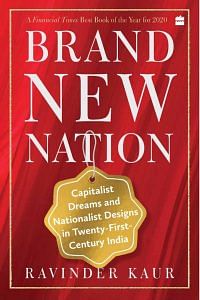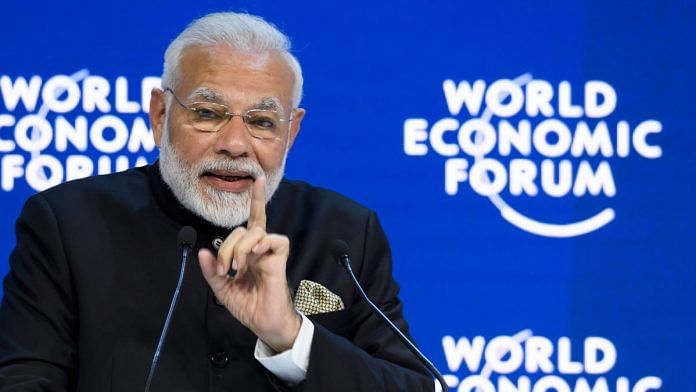We have made it so easy to invest in India, manufacture in India, and work in India. We have decided to uproot licence and permit Raj. We are replacing red tape with red carpet. —Narendra Modi, World Economic Forum, Davos
In Davos the Prime Minister is trying to project India as “open for business” and in India his chief ministers cannot prevent goons from vandalizing cinemas just because they don’t like a movie. The rule of law for investment. Right? —Journalist Tavleen Singh, Twitter, January 23, 2018
On January 28, 2018, Prime Minister Narendra Modi addressed the world’s billionaires, the celebrated captains of industry, and world leaders assembled at the annual meeting of the World Economic Forum in Davos. The address was a highly anticipated event—it was the first time in twenty years that an Indian prime minister was present in Davos. He had already been billed as a bold leader who did not hesitate to undertake tough measures to fully open up the Indian economy. The frequent reference was to two major economic interventions he had initiated— demonetization of high currency notes and the implementation of the goods-and-services tax—to transform India into a single unified market. While policy experts were still questioning the economic benefit of these reforms, his supporters held these measures up as examples of his strongman appeal and popularity among the people. Smitten with his well-crafted, market-friendly image and the promise of acche din (good times), a section of the Indian media had even begun describing him as the “smartest salesman India has had in a long while,”. the “best salesman India has ever had,” or simply “salesman-in-chief” of the Indian nation.. This famous sales pitch is precisely what Modi rehearsed in his Davos speech. He invited the world to come and invest in India, and he promised to replace “red tape with red carpet” to nudge and entice those who were still hesitant.
His speech, however, was largely drowned out in the cacophony of foreign and Indian media. The news item that had grabbed headlines and the attention of TV anchors instead was that of violent protests raging in northern India. The supporters of a little-known Rajput Hindu group, Karni Sena, were protesting against a Bollywood film due to be released on January 25 in cinema halls across India.
Also read: Modi used to be toast of the world, now his ministers are damaging Brand India by lashing out
The film in the eye of the storm was called Padmavat, a musical extravaganza based on a sixteenth-century epic poem about a legendary Rajput Hindu queen who had committed jauhar (self-immolation) to avoid being captured by the victorious army of Alaudin Khilji. The objections to the film ranged from Padmavati’s stunning, albeit scandalous, midriff-baring costumes to a widely speculated dream sequence of romance between the Hindu queen and the Muslim emperor. The protestors had accused the filmmaker and the actors of “demeaning the glorious heritage of Rajput women” and threatened to behead Deepika Padukone (the actor playing Padmavati) or at the very least cut her nose for bringing disrepute to the Rajput community. A frequent ritual performed by protestors was the burning of Padukone’s effigies, the theatrical enactment of symbolic killing as an expression of collective outrage. In Chittorgarh, the historical town associated with Padmavati, thousands of Rajput women brandishing swords marched in a Chetavani rally (Warning rally) to force the state authorities to either stop the film’s release or face the community’s wrath. On short notice, about 1,908 Rajput women had reportedly registered to perform jauhar to protect their community’s honor, under attack this time from a Bollywood filmmaker.
It seemed as if the medieval past, packaged in its violent legacy, had broken through the compartments of history to paralyze the present. And in doing so, it was threatening to corrode the modern investor-friendly image and even undo the great spectacle of Brand India that the state had carefully nurtured during the previous decades. Consider the irony: Narendra Modi had courted the world’s attention to market Brand India as the most desirable destination for global capital, but what had become prominently visible instead were the less desirable “primitive” features of identity politics that lurked beneath the brand’s glossy surface. The past appeared to be holding back the future of the nation. Or so lamented the political commentators.
This was indeed a strange moment in the life of the brand new nation. But it was neither anomalous nor exceptional. In fact, it brought to the surface the messy entanglements of capitalist growth and cultural politics on which the logic of the brand new nation has evolved for the past several decades.
Also read: The world has a message for Modi: Brand India is severely damaged
The emerging worlds in the twenty-first century appear to be familiar, even though epistemic scaffolding has changed in dramatic ways. Consider the twentieth-century internationalist imagination of the world as a “family of nations” that celebrated diversity predicated on spatial segmentations, or “culture gardens separated by boundary-maintaining values—as posited essences” that imagined the world as a series of bounded spaces. Although the family of nations continues to exist, its logics and effects have undergone a major transformation. Recall here the idea of rootedness—of cultures and people anchored in national territories—which continues to persist even in this internationalist vision of the world. The irony is that the decades of globalization did not dilute this cultural-spatial arrangement. Instead, the culture gardens were reterritorialized into enclosures of capital, each an exclusive brand that capitalized its essential cultural identity and sought to draw ever more investments to the enclosure. If once the world was a family of nations, it is now a family of brand new nations that thrive on the promise of capitalist growth and hypernationalism. This proliferation of nations turned investment destinations has created a new dynamic that allows the states to lay full claim to the national territory and even expand inward by bringing more untapped territory into the fold of investment destination. The promise of investments is held out as a mode of national integration, the healing balm that accompanies any coercive political move to extend centralized governance to the peripheries.. And in turn, the hypernationalism fueled on investment flows continues to capture and control ever more peripheries into the fold of capitalist transformation.
The investment-fueled hypernationalism is the force that drives the brand new nation. The staging of the brand new nation is often explained as a tactical move by policy makers, a necessary policy that the state needs to pursue in order to attain economic ascendance. Yet the politics of brand making helps open a vast space for social-political experimentation, the consequences of which are not always fully anticipated. In India, a quarter century of the nation-branding project has helped sharpen a specific kind of cultural politics that lives off branding of the authentic Indian difference in the world.
The push to brand the original Indian cultural essence, for example, has led to a predominance of pre-Islamic imagery combined with the globalized aesthetics of Hindu cultural identity in the nation-brand campaigns. This has also boosted the search for the uncommon—the cultural difference that is not shared with the other—that can be achieved only by continuously peeling back layers of history to reach into a mythical ancient past. The increasing focus on yoga and vegetarianism to brand India’s Hindu identity is an example of this trend. The uncommon difference, the exclusive identity not shared with others is the prime ingredient on which a successful brand is built. If this exclusive identity is deemed a profitable asset that generates economic value, then generation of economic value in turn brings recognition and respect to the uncommon and even reifies it. This also means that in order to market the exclusive inner self, the brand needs to evict the other—the Muslims, the poor, the Dalits—from the image frame, to seek the uncommon in what had once been a common cultural existence. The eviction of the matter surplus to the brand is not always limited to the image frame; the brand creates its ideal world as it ought to be in the image of the dominant group. This is where we begin to make sense of majoritarian impulses and the return of ethnonationalism (that had never left in the first place) to the field of politics.
Also read: India should use damaged Brand China, not bash it over Covid like US and Germany
Witness, then, the populist politics that shape the brand new nation: consumed with an endless supply of good news, the nation is forever in a state of optimism and anticipation of the long-promised good times. The ones who express doubts or troubling questions are at best dismissed as pessimists and at worst categorized as traitors. In fact, pessimism is itself a form of treachery, for what keeps the engine of the brand new nation running is the constant production of hope. To continue to hope amid falling economic growth is not just to trust the strong leader to manage capital but also to trust in the promise of capitalist growth to trickle-down to the poorest citizens one day. The paradox of the brand new nation is that economic downturn does not necessarily lead to the weakening of the political leadership; indeed, it potentially even strengthens it. For what keeps the brand new nation afloat is the promise of good times, the permanent state of anticipation, the dreamworlds forever a work in progress. History is endless, and the brand new nation is merely the latest manifestation of manifold futures that await us.
 Excerpted from Brand New Nation by Ravinder Kaur with permission from Standford University Press and HarperCollins India.
Excerpted from Brand New Nation by Ravinder Kaur with permission from Standford University Press and HarperCollins India.




Government comes in between in India even for smallest of business transactions and paper work and tax documentation are asked.
All the laws discourage any economic activity.
India has no future unless these conditions are changed.
People of India,
It is time to revolt against the Government.
The Govt can certainly not be trusted.
They have shown how crooked they can be.
It is a known fact that the Govt does not trust us – citizens.
They think everybody else is corrupt like themselves.
Millions of citizens have lost their jobs.
Millions of businesses have failed.
Millions of agriculturists are suffering.
Millions of traders are suffering losses.
Lakhs of people have died because of the COVID crisis.
Overall, the economy has collapsed.
And all the while, the Govt keeps saying that “Everything is fine”.
They think we are all FOOLS !!!
The Govt has done absolutely nothing for us.
Therefore it is time to revolt against the Govt.
They have promptly labeled us as “anti-nationals”, so it is time to behave like one.
This is the only way we can give a new meaning to Democracy.
-The Common Man
What have you done for the country?
Identity politics is nauseating and should be junked at earliest.
Politicians require an enemy to fight their electoral battles against by mobilizing their base. Muslims unfortunately became the horse that kept getting flogged again and again.
However, we are now truly presented with an enemy which looks down upon and mocks Indian civilization, is consistently blocking India’s rise in international institutions, promoting an illiberal global order by collaborating with despots, threatening us economically and now even challenging our sovereignty – China!
This is a formidable challenge and if channelled well, the whole nation can get behind it.
The same muslim community can become India’s trump card. Since no other muslim nation appears to have the gumption to call out China on abuses in Xinjiang, India, led by its Muslims, can take a principled position. Embarass Pakistan, Iran, Arabs, Turks, OIC into taking a position on this.